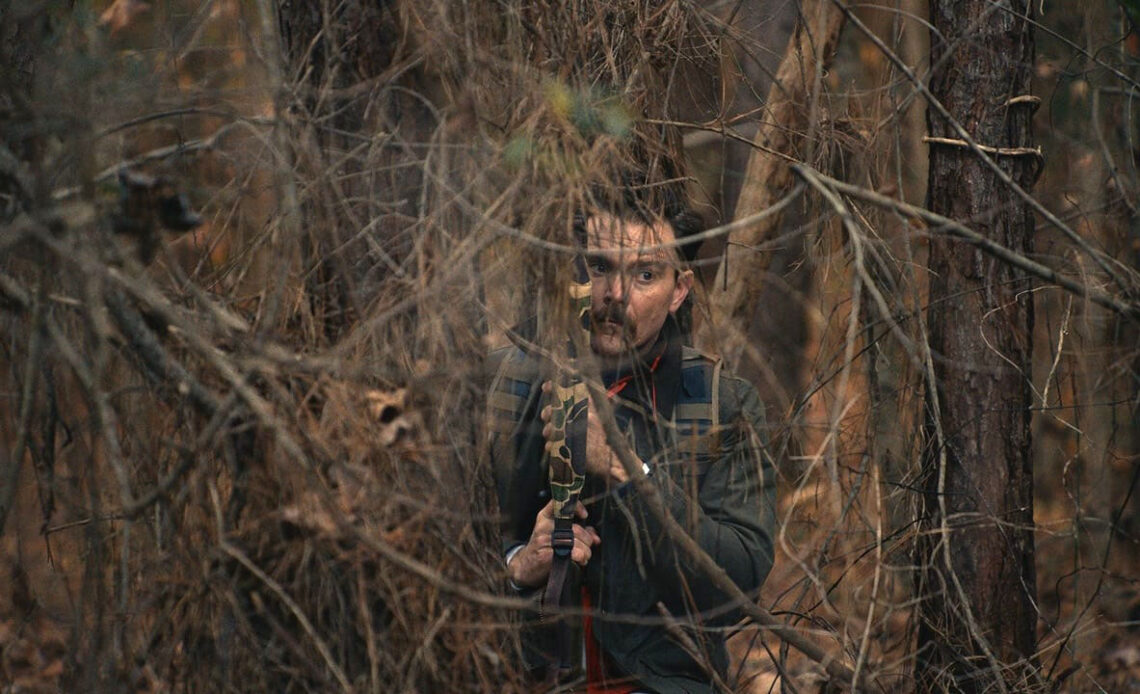Robert Machoain’s The Integrity of Joseph Chambers, his second collaboration with Clayne Crawford follows suit from his previous hit, The Killing of Two Lovers, with a brooding, introspective examination of masculinity with fatal consequences.
The Integrity of Joseph Chambers opens on a face smothered with fluffy white shaving cream as a razor blade harshly scrapes off whiskers, leaving a prominent moustache. It belongs to the eponymous Joseph Chambers (Clayne Crawford) – an insurance salesman – who presents his newly minted look to his bleary-eyed wife in bed, prancing around with a performative “hello little lady”. He is about to embark on a solo deer-hunting expedition at a nearby forest, with an ensemble and mindset that screams novice.
His enthusiasm is dampened by his wife Tess (Jordana Brewster) as they continue a conversation they have clearly had before. She warns he should wait a week until his friend and hunter Doug (Carl Kennedy) is no longer sick, but, resembling the fatuous impatience of a child, Joseph argues he needs to provide for his family if “things go wrong”. This comment alone is laced with an impending doom that will violently usurp male arrogance.
From the outset, the film adopts self-awareness as the camera gently zooms into an abyss of dead trees and crunching autumn leaves. A sinking feeling leaves the audience with a knowing suspicion Joseph’s lackadaisical attitude will lead to disturbing events. When Joseph first sets foot into the ute, its radio blares music unbearably loud, waking up nearby animals, which is a metaphor for Joseph interfering with the order of nature. Not only this, as he unpacks, he drops and fumbles rifle parts and bullets, which all accumulate as warning signs.
As Joseph roams through the forest, Machoian often cuts with ear-splitting diegetic and non-diegetic sounds that increase in volume to engulf the viewer in the vicissitudes of nature. Sound designer and Machoian collaborator Peter Albrechtson conduct an orchestra of cicadas, owls, frogs and pigeons that linger to almost reflect the tranquillity of nature and Joseph’s consciousness at the time.
In his giddy naivete, he performs an imagined baseball match, throwing stones at trees and commentating that it is “bottom of the ninth. Two outs. 1991 world series”. In the revelry, a crowd can be heard applauding and cheering, functioning as the soundtrack within his head. His imagined triumph is pyrrhic, as clumsy mistakes haunt him, faint voices echo, garbles and groans of animals become sinister and whipping wind instruments spiral him into torment.
Without spoilers, Joseph spots a deer in the distance and tracks after it, reacting wildly to any minute noise. After some harrowing events, his mood pivots from playful to panicked histrionics, mumbling to himself, “I’m gonna make this go away”. The camera is punishingly judgemental of his indiscretions by lingering on him while he is on the ground, cradled in the fetal position. The weight of his actions is an albatross on his neck, illustrated through a reverse and sped-up soundtrack, with once faint voices crystal-clear.
With spectacularly sharp sound design, cinematography and performances, The Integrity of Joseph Chambers is small in scope but elasticised by the turmoil and downward spiral of its titular character.




COMMENTS